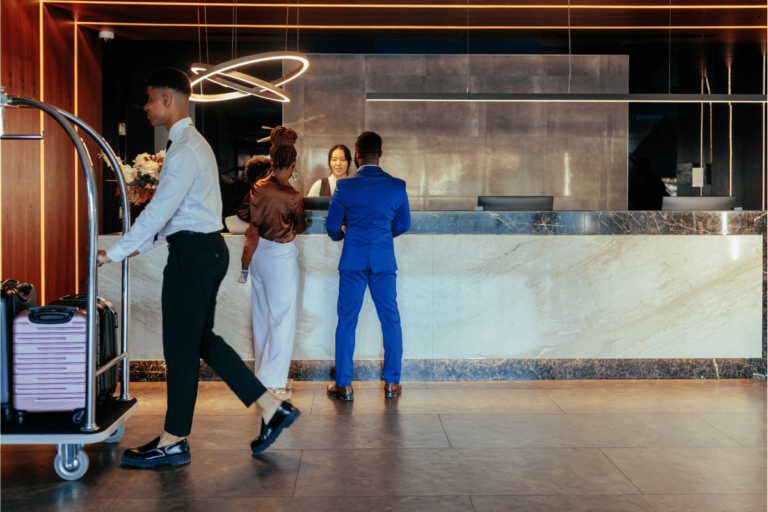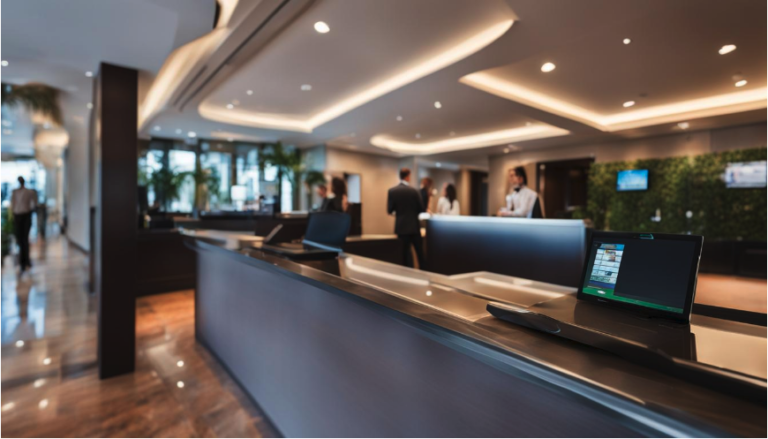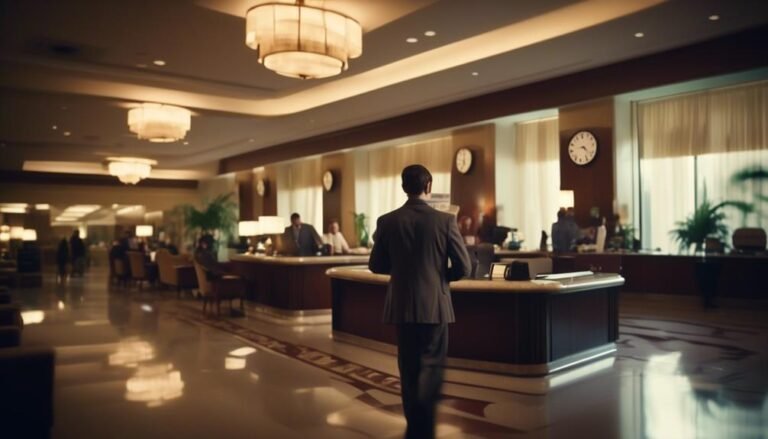Maximizing Guest Satisfaction: The Importance of High-Quality Housekeeping
Welcome to our comprehensive guide on the importance of high-quality housekeeping in the hospitality industry. In this article, we will explore how professional housekeeping services, top-notch home cleaning, and reliable housekeepers contribute to exceptional guest satisfaction. We will also discuss the expert housekeeping solutions delivered by experienced housekeeping staff, ensuring thorough house cleaning services that guests can trust. Additionally, we will provide insights into finding a trusted housekeeping company that offers affordable services.
Key Takeaways:
- High-quality housekeeping directly impacts guest satisfaction in the hospitality industry.
- Positive guest reviews and recommendations are influenced by the cleanliness and quality of service provided by the housekeeping staff.
- Investing in professional and reliable housekeeping services is crucial for the success of any hotel.
- Thorough house cleaning services and expert housekeeping solutions lead to enhanced guest satisfaction.
- Finding a trusted and affordable housekeeping company is key to maximizing guest satisfaction.
Understanding the Importance of Guest Satisfaction in the Hotel Industry
Guest satisfaction holds immense significance in the hotel industry. It directly influences a hotel’s reputation, revenue, and guest loyalty. Positive hotel reviews and recommendations carry significant weight in travelers’ decision-making process. According to a study by Hospitality Net, peer-to-peer reviews have become the most influential factor in choosing one hotel over another.
To ensure guest satisfaction, hotels must focus on meeting and exceeding guest expectations. Providing a personalized guest experience is essential in creating a lasting impression. Guests expect hotels to deliver exceptional service and maintain high standards of cleanliness. Hotel cleanliness is a crucial aspect that impacts guest satisfaction and overall experience. By prioritizing guest satisfaction, hotels can build strong guest loyalty and increase their chances of repeat bookings.
Formulating an effective guest loyalty strategy is vital for hotels to enhance guest satisfaction. This involves identifying ways to create a personalized experience for guests and exceed their expectations. By gathering feedback, analyzing guest preferences, and leveraging technology, hotels can create tailored experiences that foster loyalty and create brand advocates.
Guest satisfaction is not just a buzzword; it is the lifeblood of the hotel industry. Providing a memorable and personalized guest experience, maintaining high standards of cleanliness, and implementing a guest loyalty strategy are the pillars of a successful hotel operation.
With the increasing competition in the hospitality industry, hotels must take guest satisfaction seriously. By understanding the importance of guest satisfaction and implementing strategies to enhance it, hotels can differentiate themselves and thrive in today’s competitive market.
The Impact of Housekeeping Efficiency on Guest Satisfaction
Efficiency in housekeeping operations has a direct correlation with guest satisfaction. When a hotel maintains well-managed and organized facilities, it enhances the overall guest experience and contributes to the profitability of the establishment. By measuring the quality of service through post-cleaning inspections, hotels can ensure that high standards are consistently met. Through these inspections, any lapses in the cleaning process can be identified, allowing for improvements to be made and efficiency to be optimized.
One important aspect of housekeeping efficiency is minimizing the time needed to clean a room without compromising on the quality of service. By understanding the time from a vacant room to a cleaned room, hotels can identify bottlenecks and streamline their processes for faster and more effective cleaning. This not only improves operational efficiency but also contributes to guest satisfaction by reducing wait times.
“Efficiency is doing things right; effectiveness is doing the right things.” – Peter Drucker
The Role of Quality of Service
Guest satisfaction is closely tied to the quality of service provided by the housekeeping staff. A clean and well-maintained hotel creates a positive impression and contributes to the overall guest experience. By prioritizing attention to detail, cleanliness, and meeting guest expectations, hotels can enhance guest satisfaction and improve their reputation.
It is crucial for hotels to consistently deliver high-quality service to maximize guest satisfaction. This can be achieved through regular post-cleaning inspections, thorough training of housekeeping staff, and setting clear standards and protocols. By continually striving for excellence in service delivery, hotels can create a positive and memorable experience for their guests.
An Example Table: Housekeeping Efficiency Metrics
| Metric | Description |
|---|---|
| Time needed to clean a room | The average time taken by housekeeping staff to clean a single room |
| Vacant room to cleaned room time | The time taken from a guest checking out to the room being cleaned and prepared for the next guest |
This example table illustrates two key metrics that hotels can use to measure and assess housekeeping efficiency. By monitoring these metrics and striving for continuous improvement, hotels can enhance guest satisfaction and operational effectiveness.
Efficiency in housekeeping operations is a critical factor in ensuring guest satisfaction. By optimizing cleaning processes, delivering high-quality service, and continuously improving operational efficiency, hotels can create a positive and memorable experience for their guests.
Enhancing Housekeeping Efficiency: Strategies and Best Practices
In order to enhance housekeeping efficiency and deliver exceptional service to guests, hotels can implement a range of strategies and best practices. By leveraging technology in housekeeping operations, providing comprehensive staff training, preventing issues before they arise, organizing housekeeping carts, and optimizing laundry services, hotels can streamline their operations and maximize efficiency.
Technology in Housekeeping
Leveraging technology can greatly improve housekeeping efficiency. By implementing a Property Management System (PMS), hotels can automate tasks and improve communication among housekeeping staff. A PMS allows for seamless coordination between housekeeping and other hotel departments, ensuring that rooms are cleaned and prepared for guests in a timely manner. Additionally, housekeeping software can help track inventory, schedule cleaning tasks, and monitor staff performance, further enhancing efficiency and productivity.
Staff Training
Comprehensive staff training is crucial for maintaining high standards of cleanliness and service. By providing ongoing training for housekeeping staff, hotels can ensure that they are equipped with the necessary skills and knowledge to perform their duties efficiently. Regular training sessions can cover topics such as proper cleaning techniques, effective time management, and attention to detail. By investing in staff training, hotels can empower their housekeeping teams to deliver exceptional service and maintain a high level of guest satisfaction.
Issue Prevention
Preventing issues before they arise is key to maintaining housekeeping efficiency. Regular inspections and addressing guest feedback promptly can help identify any areas of improvement and prevent issues from escalating. By proactively resolving any cleanliness or maintenance issues, hotels can ensure that guests have a positive experience during their stay. Implementing a systematic approach to issue prevention can save time and resources in the long run, ultimately leading to improved housekeeping efficiency.
Organized Housekeeping Carts
Organizing housekeeping carts with all the necessary amenities improves efficiency and saves valuable time. By ensuring that carts are stocked with cleaning supplies, linens, toiletries, and other essentials, housekeeping staff can easily access what they need without having to search for items or make multiple trips back to storage areas. An organized cart layout and labeling system further aids in efficient workflow and task completion. By implementing this best practice, hotels can optimize housekeeping operations and enhance overall efficiency.
Efficient Laundry Service
An efficient laundry service is crucial for maintaining housekeeping efficiency. By investing in reliable laundry machines and using quality products, hotels can minimize turnaround time for clean linens and ensure an uninterrupted supply. Implementing effective processes for sorting, washing, drying, folding, and storing linens optimizes efficiency and reduces the risk of delays or shortages. By prioritizing efficient laundry service, hotels can streamline housekeeping operations and deliver exceptional service to guests.
| Technology in Housekeeping | Staff Training | Issue Prevention | Organized Housekeeping Carts | Efficient Laundry Service |
|---|---|---|---|---|
| Leverage a Property Management System (PMS) to automate tasks and improve communication. | Provide comprehensive training on proper cleaning techniques, effective time management, and attention to detail. | Regular inspections and addressing guest feedback promptly to prevent issues from escalating. | Organize housekeeping carts with all necessary amenities for easy access and task completion. | Invest in reliable laundry machines and use quality products to minimize turnaround time for clean linens. |
| Utilize housekeeping software for tracking inventory, scheduling tasks, and monitoring staff performance. | Offer ongoing training sessions to empower housekeeping staff with necessary skills and knowledge. | Proactively resolve cleanliness or maintenance issues to ensure a positive guest experience. | Implement an organized cart layout and labeling system for efficient workflow. | Establish effective processes for sorting, washing, drying, folding, and storing linens. |
Streamlining Housekeeping Operations for Fast and Efficient Service
In order to provide fast and efficient service to guests, streamlining housekeeping operations is essential. This involves optimizing various aspects of the housekeeping workflow to ensure seamless guest experiences. By implementing efficient scheduling, technology automation, and empowering staff, hotels can achieve optimal operational efficiency and maximize guest satisfaction.
Efficient Scheduling
Efficient scheduling plays a critical role in streamlining housekeeping operations. By strategically allocating staff based on occupancy levels and guest check-out times, hotels can minimize the time between check-out and room cleaning. This results in quicker room turnaround and allows for early check-ins, enhancing guest satisfaction and maximizing revenue potential. Utilizing a digital scheduling system can help automate the process and ensure efficient staff allocation.
Technology Automation
Technology automation is another key factor in streamlining housekeeping operations. Implementing a Property Management System (PMS) can streamline communication, task assignment, and tracking of housekeeping activities. By digitizing housekeeping processes, hotels can eliminate manual paperwork, reduce errors, and enhance overall efficiency. Additionally, technology solutions such as mobile housekeeping apps can enable real-time updates and streamline communication between housekeeping staff and other departments.
Empowered Staff
Empowering housekeeping staff with the right tools, training, and resources is vital for streamlining operations. Providing comprehensive training programs ensures that staff members are equipped with the necessary skills and knowledge to perform their duties efficiently. Empowered staff members are more motivated and able to make informed decisions to enhance the guest experience. Regularly soliciting feedback from staff and recognizing their contributions also fosters a positive work environment, ultimately leading to improved efficiency in housekeeping operations.
Streamlining housekeeping operations through efficient scheduling, technology automation, and empowered staff creates a seamless guest experience. By optimizing these key aspects, hotels can save valuable time, enhance operational efficiency, and deliver exceptional service, ultimately maximizing guest satisfaction.
Maximizing Guest Satisfaction through Quality of Service
Providing a high quality of service is key in maximizing guest satisfaction. The cleanliness and attention to detail in a hotel significantly impact the overall guest experience. From the moment they enter their room, guests form impressions based on the cleanliness and presentation of the space. Therefore, it is crucial for hotels to prioritize and consistently deliver exceptional service to meet and exceed guest expectations.
One effective way to ensure high quality of service is through post-cleaning inspections. These inspections help identify any areas that may have been overlooked during the cleaning process, enabling the housekeeping staff to rectify the issues before the guest arrives. By conducting thorough inspections, hotels can guarantee that all necessary tasks are completed to the highest standards, thus enhancing the overall guest experience.
Cleanliness plays a vital role in guest satisfaction as it directly contributes to the overall impression of a hotel. Attention to detail in maintaining cleanliness throughout the property, from common areas to guest rooms, creates a positive atmosphere and enhances the guest’s stay. This includes not only the visible cleanliness but also ensuring that hidden areas, such as corners or behind furniture, are well-maintained. By consistently prioritizing cleanliness and attention to detail, hotels can create a positive environment that promotes guest satisfaction and loyalty.
Efficient Time Management in Housekeeping Operations
Efficient time management is crucial in housekeeping operations to ensure a quick room turnaround, optimize staff levels, minimize operational expenses, and streamline processes. By effectively managing time, hotels can enhance their overall efficiency and maximize guest satisfaction.
To achieve quick room turnaround, it is essential to establish a well-structured cleaning schedule that allows sufficient time for housekeepers to clean each room thoroughly. By carefully balancing staff levels based on the time needed to clean a room, hotels can optimize labor costs while maintaining high standards of cleanliness. This approach ensures that housekeepers have the necessary time and resources to perform their duties efficiently.
In addition to managing staff levels, hotels can implement optimized processes and leverage technology to streamline housekeeping operations. Utilizing digital task management systems and automation tools helps assign and track cleaning tasks, reducing administrative burden and minimizing errors. By optimizing processes and utilizing technology, hotels can improve overall efficiency, save time, and enhance the guest experience.
| Benefit | Explanation |
|---|---|
| Quick Room Turnaround | Efficient time management allows for faster room cleaning, enabling early check-ins and increasing revenue potential. |
| Optimized Staff Levels | By balancing the number of housekeeping staff based on room cleaning time, hotels can minimize operational expenses while maintaining service quality. |
| Minimized Operational Expenses | Proper time management reduces labor costs and ensures effective resource allocation, resulting in cost savings. |
| Streamlined Processes | Implementing optimized processes and utilizing technology helps reduce inefficiencies and streamline housekeeping operations. |
Efficient time management in housekeeping operations is a critical component of overall hotel success. By optimizing staff levels, implementing streamlined processes, and leveraging technology, hotels can achieve quick room turnaround, minimize operational expenses, and deliver top-notch service to their guests.
Creating a Positive Work Environment for Housekeeping Staff
The well-being and satisfaction of housekeeping staff play a crucial role in delivering exceptional service and maximizing guest satisfaction. A happy workplace fosters a positive atmosphere, enhances productivity, and promotes staff retention. Here are some key factors to consider when creating a positive work environment for housekeeping staff:
Staff Training and Development
Investing in staff training and development is essential for their professional growth and job satisfaction. Providing opportunities for skill enhancement and career advancement not only improves their performance but also demonstrates that their contributions are valued.
Teamwork and Recognition
Cultivating a culture of teamwork fosters collaboration and mutual support among housekeeping staff. Encouraging open communication, recognizing individual and team achievements, and celebrating milestones create a sense of camaraderie and motivation within the team.
Employee Well-being
Prioritizing employee well-being involves promoting work-life balance, ensuring fair work schedules, and providing necessary resources and support. Addressing concerns, offering competitive compensation, and creating a safe and inclusive work environment contribute to overall employee satisfaction and retention.
By prioritizing a happy workplace and implementing strategies to support staff training and development, teamwork, recognition, and employee well-being, hotels can create a positive work environment for their housekeeping staff. When staff feel valued and motivated, they are more likely to go the extra mile in delivering exceptional service, ultimately enhancing the overall guest experience.
Cost-Effective Solutions for Optimizing Housekeeping Operations
The hospitality industry is always seeking ways to optimize housekeeping operations while maintaining high levels of guest satisfaction. By implementing cost-effective solutions, hotels can achieve efficiency, reduce operational expenses, and enhance their overall performance. Here are some key strategies to consider:
Energy-Efficient Systems
Investing in energy-efficient systems can significantly reduce utility costs in housekeeping operations. Utilize LED lighting, motion sensors, and smart thermostats to minimize energy consumption. This not only reduces expenses but also supports sustainability initiatives, which can be a positive selling point for environmentally conscious guests.
Waste Management
An effective waste management program can help hotels optimize costs and reduce their environmental footprint. Implement recycling initiatives, encourage staff to practice waste segregation, and explore partnerships with local recycling facilities. By reducing waste, hotels can lower disposal expenses and contribute to a cleaner environment.
Data Analytics and Performance Metrics
Utilizing data analytics and performance metrics allows hotels to gain valuable insights into their housekeeping operations. By tracking key performance indicators such as room cleaning times, staff productivity, and guest satisfaction scores, hotels can identify areas for improvement and make data-driven decisions. This enables them to allocate resources efficiently and address any operational inefficiencies proactively.
| Key Performance Indicators (KPIs) | Metrics |
|---|---|
| Room Cleaning Time | Average time taken to clean and prepare a room for the next guest |
| Staff Productivity | Number of rooms cleaned per staff member per shift |
| Guest Satisfaction Scores | Ratings and feedback provided by guests regarding cleanliness and service quality |
By leveraging these cost-effective solutions, hotels can optimize their housekeeping operations, improve guest satisfaction, and achieve their financial goals. Investing in energy-efficient systems, implementing effective waste management strategies, and utilizing data analytics are essential steps towards sustainable and efficient housekeeping practices.
Importance of Clear Processes and Organization in Housekeeping Operations
Clear processes and organization are critical for efficient and effective housekeeping operations. By establishing well-defined protocols and clearly defining staff roles, hotels can ensure that tasks are executed efficiently and to the highest standards. Having clear processes in place helps streamline operations, minimize errors, and optimize productivity.
A well-organized housekeeping cart is essential for efficient service delivery. By organizing carts with all necessary amenities, housekeepers can save time and easily access the required supplies during their cleaning rounds. This not only improves efficiency but also enhances the overall guest experience by ensuring that all guest needs are met promptly and seamlessly.
Another key aspect of organization in housekeeping operations is the proper organization of the laundry department. By implementing efficient laundry department organization, hotels can ensure the timely delivery of clean linens. This helps maintain a seamless guest experience and enables the housekeeping staff to perform their duties without any delays or interruptions.
The Importance of Clear Processes and Organization
Having clear processes and organization in housekeeping operations offers several benefits:
- Improved efficiency: Clear processes eliminate confusion and ensure that tasks are completed in a timely manner. This helps maximize productivity and minimize wastage of time and resources.
- Consistency: With well-defined protocols, hotels can ensure that the quality of service is consistently high across all rooms and areas. This enhances guest satisfaction and helps build a strong reputation.
- Effective communication: Clear processes facilitate better communication among the housekeeping staff, enabling them to coordinate their efforts and address any issues or concerns promptly.
- Optimized resource allocation: By clearly defining staff roles and responsibilities, hotels can optimize resource allocation and ensure that the right people are assigned to the right tasks, leading to increased efficiency.
“Having clear processes and organization in place is essential for smooth and efficient housekeeping operations. It helps ensure that tasks are completed in a timely manner, enhances the guest experience, and maximizes overall operational efficiency.”
In conclusion, clear processes and organization play a vital role in optimizing housekeeping operations. They improve efficiency, consistency, and communication, while also enabling effective resource allocation. By prioritizing clear processes and organization, hotels can enhance guest satisfaction, deliver exceptional service, and achieve operational excellence.
| Benefits of Clear Processes and Organization | Housekeeping Operations |
|---|---|
| Improved efficiency | Maximizes productivity and minimizes wastage of time and resources |
| Consistency | Ensures consistent high-quality service across all rooms and areas |
| Effective communication | Facilitates better coordination and prompt resolution of issues |
| Optimized resource allocation | Ensures the right people are assigned to the right tasks, increasing efficiency |
Conclusion
High-quality housekeeping plays a vital role in ensuring guest satisfaction and achieving optimal operational efficiency in hotels. By focusing on delivering exceptional service and maintaining cleanliness, hotels can create a positive guest experience and foster loyalty.
Efficient time management is crucial in housekeeping operations to maximize productivity and revenue potential. By minimizing the time needed to clean a room and balancing staff levels, hotels can optimize their operations while maintaining profitability.
Implementing cost-effective solutions, such as energy-efficient systems and waste management strategies, not only reduce expenses but also promote sustainability. By utilizing data analytics and performance metrics, hotels can make informed decisions and continuously improve their housekeeping operations.
Overall, by prioritizing high-quality housekeeping, efficient time management, and implementing cost-effective solutions, hotels can enhance guest satisfaction, achieve optimal operational efficiency, and establish a strong reputation in the hospitality industry.







